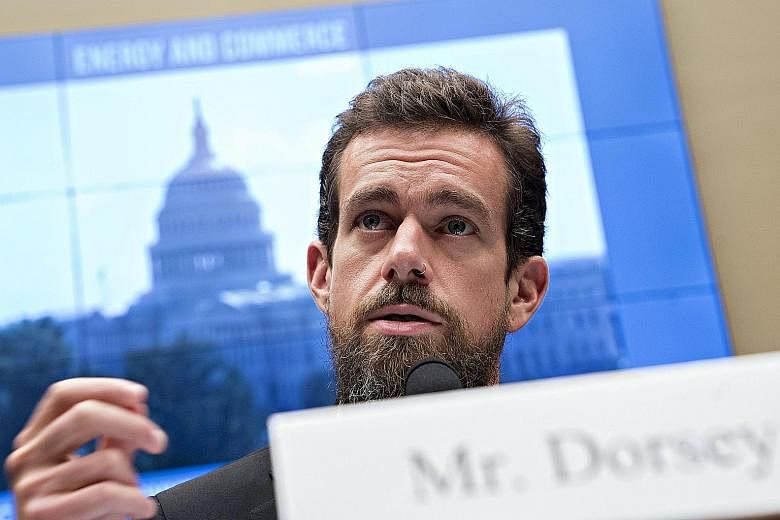Twitter chief executive Jack Dorsey on Wednesday signalled that there will be "tectonic shifts" in the company and the industry as it changes the way it incentivises users.
In a hearing before the Senate Intelligence Committee on combating foreign interference and manipulation in US elections, Mr Dorsey also outlined efforts the social media giant is taking to prevent abuse.
The hearing, which saw Mr Dorsey field questions alongside Facebook's chief operating officer Sheryl Sandberg, underscored the steep learning curve of lawmakers as they struggle to contend with the influence the social media platforms have had on politics.
No solutions emerged.
But the companies maintained that they are not sitting still.
TAKING ACTION AGAINST ABUSE
Both Facebook and Twitter have been proactive in recent months in adjusting algorithms, promoting credible news to balance misinformation, and shutting down malicious accounts.
They are grappling with balancing the openness that is at the core of their platforms, with the need for controls. But it may be too late to stave off some form of regulation, which officials are seeking.
Mr Dorsey told senators that the company had not anticipated its exponential growth. Neither did it predict nor understand the real-world negative consequences generated.
"We acknowledge that now, and are determined to find holistic and fair solutions," he said. "We have witnessed abuse, harassment, troll armies, manipulation through bots and human coordination, misinformation campaigns and increasingly divisive echo chambers."
He added: "We aren't proud of how people have taken advantage of our service, or our inability to address it fast enough. We need to question the fundamental incentives that are in our product today.
"We must ask the question: 'What is Twitter incentivising people to do, and why?' The answers will lead to tectonic shifts in how Twitter, and our industry, operates."
An empty seat had been left for a representative from Google. Alphabet, Google's parent company, declined to send chief executive Larry Page. This did not go down well with the senators.
Facebook's Ms Sandberg admitted it had been too slow to respond to manipulative messaging from Russia during the 2016 election, but Facebook had sharply raised its response and is now more proactive.
Mr Dorsey warned that required changes "won't be fast or easy".
ADDRESSING ALLEGATIONS
OF BIAS Last week, US President Donald Trump accused Google of "rigged" search results, tweeting: "Republican/Conservative & Fair Media is shut out. Illegal?"
In a statement after the Senate hearing, the Justice Department said Attorney-General Jeff Sessions has "convened a meeting with a number of state attorneys-general this month to discuss a growing concern that these companies may be hurting competition and intentionally stifling the free exchange of ideas on their platforms".
Later in the day, Mr Dorsey faced a different hearing alone at the House Energy and Commerce Committee, focused on transparency and accountability, where he said the company's priority was to ensure elections were not interfered with by foreign entities.
As for accusations of political bias, he said: "We analysed tweets sent by all members of the House and Senate, and found no statistically significant difference between the number of times a tweet by a Democrat is viewed versus a Republican, even after our ranking and filtering of tweets has been applied."
The House hearing was more partisan. Democrat Frank Pallone of New Jersey accused President Trump and Republicans of peddling "conspiracy theories about Twitter and other social media platforms to whip up their base and fund raise".
"I fear the Republicans are using this hearing for those purposes instead of addressing the serious issues raised by social media platforms that affect Americans' everyday lives," he said.
But Mr Joe Barton, a Republican from Texas, told Mr Dorsey: "We wouldn't be having this discussion if there wasn't a general agreement that your company had discriminated against conservatives."
The start of the Senate hearing also saw the sort of person social media giants struggle to contend with: Mr Alex Jones, a conspiracy theorist with a considerable following whose radio show has recently been taken off YouTube and Facebook.
He kept interrupting Senator Marco Rubio as he was trying to answer journalists' questions. At one point, he patted him on the shoulder, to which Mr Rubio responded: "Don't touch me again, man."

